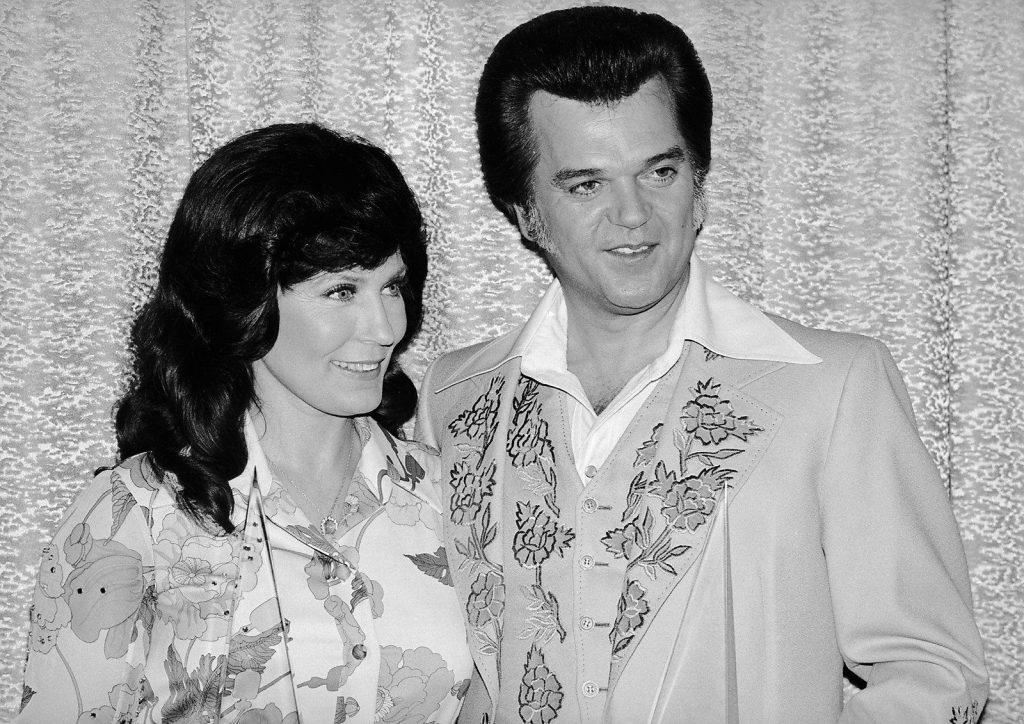“After the Fire Is Gone” by Loretta Lynn and Conway Twitty is a classic country duet that captures the raw emotion of forbidden love and the complicated aftermath of infidelity. Released in 1971, the song was the first single from the duo’s collaborative album We Only Make Believe. It became an instant hit, reaching number one on the Billboard Hot Country Singles chart and marking the beginning of one of country music’s most iconic partnerships.

Written by L.E. White, “After the Fire Is Gone” tells the story of two people who turn to each other for comfort after the passion in their respective marriages has faded. The song explores the moral ambiguity of their actions, as they seek solace in each other’s arms despite knowing the consequences of their affair. The opening lines, “Love is where you find it / When you find no love at home,” set the stage for a narrative steeped in longing and regret, revealing the complexities of love and desire.
Loretta Lynn and Conway Twitty’s vocal performances are what truly bring this song to life. Their voices, each distinct yet perfectly complementary, blend together in a way that conveys both the intensity of their connection and the underlying sadness of their situation. Lynn’s powerful, emotive voice contrasts with Twitty’s smooth, rich baritone, creating a dynamic that underscores the tension between passion and guilt.
The chorus of the song is particularly poignant: “But there’s nothing cold as ashes / After the fire is gone.” This line captures the essence of the song—what was once a burning desire has now turned to cold, lifeless ash, symbolizing the fleeting nature of their affair and the emptiness that follows. The imagery is vivid, evoking the aftermath of a love that was intense but ultimately unsustainable.
Musically, “After the Fire Is Gone” is a perfect example of classic country, with its straightforward arrangement that allows the lyrics and vocal performances to take center stage. The instrumentation is minimal, featuring twangy guitars, steady drums, and subtle steel guitar accents that add to the song’s melancholic mood. The production is clean and crisp, typical of early ’70s country music, yet it retains a certain rawness that enhances the emotional depth of the track.
The success of “After the Fire Is Gone” was not just a one-time achievement; it was the beginning of a legendary partnership between Lynn and Twitty. The duo would go on to record numerous duets together, many of which also became hits. Their chemistry, both in the studio and on stage, was undeniable, and they became one of the most beloved duos in country music history. Their collaborations earned them several awards, including multiple CMA Vocal Duo of the Year honors.
Beyond its commercial success, “After the Fire Is Gone” is significant for its portrayal of complex adult emotions in a genre often associated with straightforward themes of love and heartbreak. The song doesn’t shy away from the moral gray areas, instead choosing to delve into the intricacies of human relationships and the consequences of straying from societal norms. This willingness to explore difficult subjects is part of what made Loretta Lynn and Conway Twitty so influential in country music.
For Loretta Lynn, “After the Fire Is Gone” was another example of her fearless approach to songwriting and performance. Known for tackling controversial topics in her solo work—such as in songs like “The Pill” and “Rated X”—Lynn brought that same boldness to her duets with Twitty. The song resonates with listeners because it feels real; it acknowledges that life and love are often complicated and messy.
In the years since its release, “After the Fire Is Gone” has remained a staple in the country music canon. It is frequently cited as one of the greatest country duets of all time, and its influence can be seen in the work of subsequent generations of country artists who have explored similar themes of love, loss, and moral ambiguity. The song’s timeless appeal lies in its honesty and the emotional truth conveyed through the voices of two of country music’s greatest legends.
In conclusion, “After the Fire Is Gone” by Loretta Lynn and Conway Twitty is a powerful and poignant exploration of love, desire, and the consequences of infidelity. With its heartfelt lyrics, emotive vocal performances, and classic country sound, the song continues to resonate with audiences more than five decades after its release. It stands as a testament to the enduring power of country music to tell stories that are both deeply personal and universally relatable.
🎵 Let’s sing along with the lyrics! 🎤
Love is where you find it
When you find no love at home
And there’s nothin’ cold as ashes
After the fire is gone
The bottle is almost empty
The clock just now struck ten
Darlin’ I had to call you
To our favorite place again
We know it’s wrong for us to meet
But the fire’s gone out at home
And there’s nothin’ cold as ashes
After the fire is gone
Love is where you find it
When you find no love at home
And there’s nothin’ cold as ashes
After the fire is gone
Your lips are warm and tender
Your arms hold me just right
Sweet words of love you remember
That the one at home forgot
Each time we say is the last time
But we keep hangin’ on
And there’s nothin’ cold as ashes
After the fire is gone
Love is where you find it
When you find no love at home
And there’s nothin’ cold as ashes
After the fire is gone